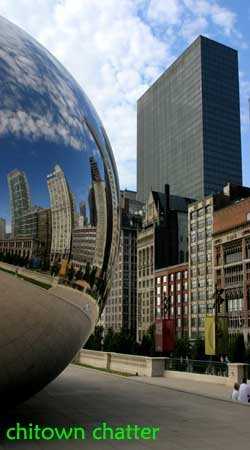
Now that warm weather is here, what could be better than a long bike ride with hundreds of other people? It's been about 6 months since my last one, so I decided it was time to hit up
Critical Mass, particularly since this would be Ana's last chance to attend a Mass before she moves to Berkeley. So, after work, we grabbed our backpacks and helmets, and Katherine grabbed a Rhode Island flag and hat.
Katherine: Look, I even brought a costume this time! I'm Rhode Island!
Everyone else: Wait, what? Why did you bring a costume?
Katherine: Aren't we supposed to have costumes? Oh wait, last time we went in October, and it was Halloween...
At least she didn't look out of place with the flag-cape. The Mass always attracts plenty of sideshow-like acts, and this ride was no exception. There were
small children, Bush protesters, acoustic guitarists singing about Carl Sandburg,
people in underwear, and "Less gas, more beer" signs. We roughly followed
this route, which took us through lots of parts of the South Side I'd never seen before, past a building that smelled like a muffin factory (yum!) and another building that smelled like manure (gag). At one point, the Mass wound its way to Ashland and 31st, and I wasn't sure why we were all stopping, until I realized someone had lit a colored smoke bomb. After much cheering, angry honking and many
Chicago hold-ups, we continued on our way, and ended the ride 3 hours later at the 31st Street beach.
That was the good part of the ride. The not-so-good part of the ride came when the cops started breaking up the Mass and arresting people with beers. Granted, this is obviously an open container violation, but this was the first time I'd felt a hostile police presence at a ride. (Usually the cops help us cork intersections.) As I watched in horror, a cop yanked a beer out of one guy's hand and threw it on the ground, then shoved him in the back of a squad car. He threw the guy's bike into the trunk and then roughly slammed the trunk. It didn't shut, and the crowd collectively groaned. A voice shouted, "Let my people go!"
We forged on. At a subsequent intersection, a crowd had gathered menacingly around a car with the crumpled remains of a bike frame underneath. I'd seen the cyclist earlier, toting a small dog in a basket. "You killed my dog!" he yelled at the driver. She leaned out the window and pointed angrily, "Well, that guy put his bike on my car!" "She won't get away with this!" the others shouted, "Take pictures of her license plate!" The crowd jeered, and cell phone cameras dutifully began clicking. We decided to stop rubbernecking and move on before some sort of vigilante bike mafia action took place.
At this point, we realized that the crowd had thinned substantially, and we couldn't see anyone ahead of us. Oy! Luckily, there were spotters posted at intersections directing people where to go next. We paused at a light to regroup. "Mass up, mass up!" went the exhortations. "Cars are starting to cut us off, mass up and stick together!" How do you keep a band of bikers together if they don't know where they're going and there's no official leadership? Somehow, people emerge from the woodwork to direct traffic and block intersections. Like self-correcting RNA transcripts, the Mass is surprisingly resilient to failure.
This being my third Critical Mass, and one fraught with tension from non-bikers, I gave some thought as to why we mass, and what statement is being projected. I've spoken to other cyclists who say they don't support the rides and see it as a gratuitous display and disruption of traffic. We could debate till sunrise about whether the publicity and education generated by the rides outweighs the ire raised in drivers and the occasional arrest; I don't think you can say definitively whose side is in the right. However, in a post over the CCM listserv, Adam Kessel raises a very good point to the critics:
The main difference that CM makes, I believe, is in the time between rides, when otherwise depoliticized cyclists start to take action; to write letters to their representatives and city councillors; to argue with their neighbors, families, and friends; to become increasingly aware of the primary role that the private automobile plays in determining foreign and domestic policy, in separating out rich from poor and black from white, in causing more deaths, injuries, and illnesses than all of the leading 'public health' villains.Critical Mass promotes a vision where cycling is mainstream, an alternative option to our car-centric culture, a place where fear is eliminated and bikers feel safe to ride in traffic, as traffic. For a brief, ephemeral afternoon, we ride in an imaginary cocoon, united with strangers. And then I leave, alone but mobilized with a message. Looking back at the number of people I've convinced to start biking, I think I'm doing pretty good.




